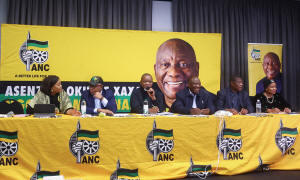South Africa's ANC meets to decide on preferred coalition partners
 Send a link to a friend
Send a link to a friend
 [June 06, 2024]
By Kopano Gumbi and Nellie Peyton [June 06, 2024]
By Kopano Gumbi and Nellie Peyton
JOHANNESBURG (Reuters) - African National Congress leaders began talks
on Thursday to try to agree on potential partners to form a new South
African government after the ANC lost its parliamentary majority for the
first time in the democratic era.
The former liberation movement has run South Africa since it swept to
power with Nelson Mandela at the helm in the 1994 election that marked
the end of apartheid, but was punished for its checkered record in last
week's election.
While still the largest party, the ANC can no longer govern alone and
signalled on Wednesday it would seek to form a government of national
unity with a wide range of parties.
"This is a time for sober minds," said ANC Secretary-General Fikile
Mbalula as members of the party's National Executive Committee (NEC)
gathered at a Johannesburg hotel for a day of talks on what strategy to
pursue.
"We're not dealing with the discussions from a point of view of locking
ourselves into one option. We're looking at all options," he told
reporters.
Mbalula said President Cyril Ramaphosa would disclose what the NEC had
decided in a closing address.
The stakes are high for South Africa, which has been struggling with
sluggish economic growth, high levels of poverty and unemployment, a
persistent racial wealth divide, severe power shortages and political
corruption.

The electoral math has created a complex situation for the ANC, which
will have 159 of the 400 seats in the new National Assembly.
Its nearest rivals are the pro-business, white-led Democratic Alliance
(DA), with 87 seats, the populist uMkhonto we Sizwe (MK) led by former
president Jacob Zuma, with 58, and the hard-left Economic Freedom
Fighters (EFF) with 39.
"We have engaged with everybody and we are talking to even smaller
parties. We want to bring everyone on board," said Mbalula.
The DA, for its part, signaled on Wednesday that it did not want to join
a government that also included MK or the EFF.
ANC COALITION-BUILDING HAS NO EASY ANSWER
Any deal with the DA would be welcomed by financial markets but
unpopular with many ANC supporters who regard it as a champion of what
some South Africans call "white monopoly capital".
[to top of second column]
|

ANC's President Cyril Ramaphosa looks with members of the National
Executive Committee (NEC), Deputy President Paul Mashatile, Gwede
Mantashe, Fikile Mbalula, Nomvula Mokonyane and Dr Gwen Ramokgopa
during a meeting looking at options to form a new South African
government, its Secretary-General Fikile Mbalula said in Boksburg,
in the East of Johannesburg, South Africa, June 6, 2024. REUTERS/Siphiwe
Sibeko

Underlining that dynamic, a group of anti-DA protesters stood
outside the hotel where the NEC meeting was taking place, holding
placards with slogans such as "The DA wants to destroy the ANC" and
"Not in our names".
On the other hand, a deal with the EFF or MK, which advocate
nationalizing mines and seizing land without compensation, would be
more popular with some in the ANC base but rattle investors.
Both the EFF and MK are led by former ANC figures who broke away and
are at odds with the current leadership. Zuma in particular openly
loathes Ramaphosa, and his party said after the election that it
would not work with "the ANC of Ramaphosa".
The ANC spokesperson said on Wednesday the party would not talk to
any counterparts that demanded Ramaphosa's resignation as a
condition of joining a governing alliance.
On Thursday, Mbalula added: "It's been very difficult to engage with
MK. It depends after this meeting if we will still meet with them."
Zuma was forced to quit as president in 2018 after a series of
corruption scandals, and was jailed for contempt of court after
refusing to participate in an inquiry into corruption.
He remains well liked in his home province, populous KwaZulu-Natal,
where extra police have been deployed this week to maintain public
order. The province was the scene of deadly riots in 2021 when Zuma
was sentenced.
(Additional reporting by Bhargav Acharya and Alexander Winning;
Writing by Estelle Shirbon; Editing by Kevin Liffey)
[© 2024 Thomson Reuters. All rights reserved.]This material
may not be published, broadcast, rewritten or redistributed.
Thompson Reuters is solely responsible for this content.
 |